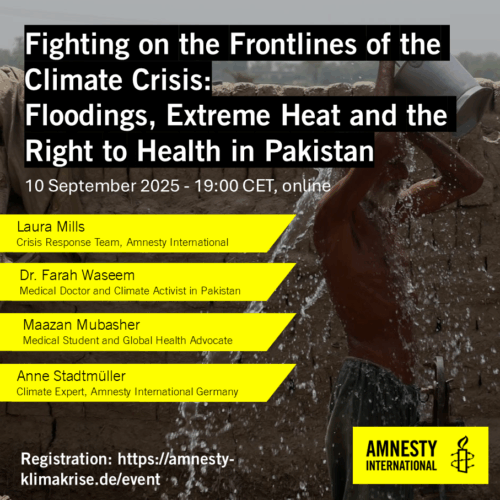On September 10, 2025, the German Amnesty Climate Crisis and Human Rights Coordination Group hosted an event to present Amnesty International’s new report, “Uncounted: Invisible deaths of older people and children during climate disasters in Pakistan“. Together with 25 participants, we explored the situation in Pakistan, on how extreme weather events severely impact the right to health and social justice.
Marcel Bodewig, a member of the Amnesty Climate Crisis and Human Rights Coordination Group, opened the event with a clear message: The climate crisis is a global challenge that disproportionately affects countries like Pakistan, which contribute the least but suffer the most. He noted that while the effects of the climate crisis, such as extreme heat and flooding, are felt in Germany, they are existential threats in countries like Pakistan. Marcel Bodewig emphasized the importance of centering the voices of those affected, rather than speaking about them, particularly in the Global North-South context.
Laura Mills, from Amnesty International’s Crisis Response Team, presented the key findings of the report. Pakistan, responsible for only 0.32% of global emissions, is among the most severely impacted countries by climate change. Periods of extreme heat exceeding 50°C alternate with devastating floods that render entire regions uninhabitable.
A critical issue highlighted was the inadequate recording of deaths: only about 5% of deaths are documented, and climate-related causes, such as those stemming from floods or heatwaves, often remain invisible. Amnesty conducted its own investigation, combining statistical data from the Pakistan Hospital Network (IHHN) with 210 interviews with relatives of those who died due to climate-related disasters. These interviews revealed how people lived for weeks without access to clean water, medical care, or emergency shelters.
Laura Mills shared a powerful story of a mother whose one-year-old daughter died after a flood because she was completely wet for a long period of time, while no help arrived. For weeks, many people lived on elevated roadsides, lacking access to clean water or essential items like mosquito nets. Over 2,000 health facilities were destroyed by floods, and extreme heat in cities like Karachi, exacerbated by power outages and a lack of cooling centers, further strains the healthcare system. Laura Mills criticized the inadequate disaster warnings and lack of government support, as well as the absence of electricity and social protections for vulnerable groups like older people and children. She called for an end to fossil fuels, increased international climate financing, and reparations instead of loans, as Pakistan is not responsible for the climate crisis.
The subsequent panel discussion, moderated by Marcel Bodewig, featured two perspectives from Pakistan: Dr. Farah Waseem, a medical doctor and climate justice advocate, and Maazan Mubasher, a medical student and member of the International Federation of Medical Students Association Pakistan.
Dr. Farah Waseem described the dire situation in Pakistan’s public hospitals, where 40% of the population lives below the poverty line and often must sell everything to afford medical care. Hospitals are overwhelmed, lacking beds, with patients forced to stay in corridors. Many mothers have no safe place to give birth. Climate disasters like floods exacerbate this crisis, leading to a rise in diseases like dengue fever and malaria. Death certificates often misattribute causes, for example listing pneumonia instead of climate-related factors.
Farah Waseem criticized the fact that, at the January 2023 “International Conference on Climate Resilient Pakistan” in Geneva, the international community pledged around USD 11 billion for Pakistan’s recovery and resilience after the 2022 floods, but only about USD 4.5 billion has been delivered. Farah Waseem also addressed the international dimension, urging the global community to take responsibility while pointing out Pakistan’s lack of early warning systems, disaster preparedness, or contingency planning: “The world has abandoned us, but our leaders are also failing us.”
Maazan Mubasher shared his experiences working in public hospitals, where there is a severe shortage of beds and infrastructure. During floods, diseases like cholera and dengue fever surge. He highlighted the gap between private and public hospitals and discrimination based on gender and socioeconomic status. Maazan Mubasher shared how his own life has been affected by repeated flooding: his apartment has been flooded seven times, destroying furniture and belongings. He criticized the inadequate infrastructure, particularly the inefficient drainage system, as well as the lack of public awareness and government support.
Anne Stadtmüller, a member of the Climate Crisis and Human Rights Coordination Group, concluded the event with a reflection on the intersectional dimensions of the climate crisis. She emphasized Germany’s responsibility, the importance of Amnesty International’s work, and the need to amplify the voices of those affected. Anne called on participants to join the Climate Strike on September 20, 2025, to send a strong signal for climate justice.
The event provided a compelling insight into the urgency of the climate crisis and its impact on human rights, particularly in Pakistan. The moving accounts from the speakers underscored the need for global climate justice. The evening was not only inspiring but also a powerful call to action for greater solidarity and concrete measures to address the climate crisis. We extend our heartfelt thanks to all speakers and participants for the engaging discussion and valuable insights and stand in solidarity with those people affected by the climate crisis in Pakistan and around the world.

